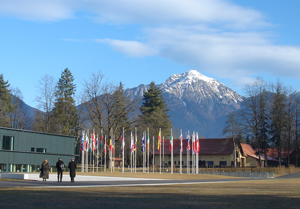Conference on Challenges of EU27 Development Policy with a Technical Seminar on the European Development Fund, Brdo, Slovenia, 17-18 February 2008
 Charalambos represented CARDET and participated in the conference on “Challenges of EU27 development policy” on 18 February 2008 at Brdo, Slovenia. The Cyprus Ministry of Foreign Affairs, invited CARDET to participate in the event, since there was a provision for NGOs to be represented in this discussions. The conference provided the opportunity for an open discussion on the challenges the EU development policy is facing. Topics discussed included aid effectiveness, division of labor, funding mechanisms as well as children and women in armed conflicts with particular reference to EU development policy. An informal discussion on future organizational aspects of EU development policy took place during a working lunch.
Charalambos represented CARDET and participated in the conference on “Challenges of EU27 development policy” on 18 February 2008 at Brdo, Slovenia. The Cyprus Ministry of Foreign Affairs, invited CARDET to participate in the event, since there was a provision for NGOs to be represented in this discussions. The conference provided the opportunity for an open discussion on the challenges the EU development policy is facing. Topics discussed included aid effectiveness, division of labor, funding mechanisms as well as children and women in armed conflicts with particular reference to EU development policy. An informal discussion on future organizational aspects of EU development policy took place during a working lunch.
The conference was accompanied by a “technical seminar on the European Development Fund” which brought together representatives of both civil society and private sector involved in development cooperation for an exchange of experience and information. Each Member State was requested to invite one representative from a national NGO and the business sector active in the field of development cooperation, to participate in the technical seminar.
The European Development Fund (EDF) is the main instrument for providing aid for development cooperation. In the year 1957 the Treaty of Rome was signed, which provided a mechanism for technical and financial assistance, initially to African countries. EDF is funded by the Member States, is subject to its own financial rules and is managed by a specific committee. Each EDF is concluded for a period of around five years. EDF consists of several instruments, including grants, risk capital and loans to the private sector. The ninth EDF has been allocated 13.5 billion for the period 2000-2007.
The tenth EDF provides an overall budget of EUR 22 682 million and covers the period from 2008 to 2013. Of this amount, EUR 21 966 million is allocated to the African Caribbean Pacific countries, EUR 286 million to the Overseas Countries and Territories and EUR 430 million to the Commission as support expenditure for programming and implementation of the EDF. An increased share of the budget is devoted to regional programs, thereby emphasizing the importance of regional economic integration as the basic framework for national and local development. An innovation in the tenth EDF is the creation of “incentive amounts” for each country. In addition, EU countries have their own bilateral agreements and implement their own initiatives with developing countries that are not financed by the EDF or any other Community funds.

 Charalambos represented CARDET and participated in the conference on “Challenges of EU27 development policy” on 18 February 2008 at Brdo, Slovenia. The Cyprus Ministry of Foreign Affairs, invited CARDET to participate in the event, since there was a provision for NGOs to be represented in this discussions. The conference provided the opportunity for an open discussion on the challenges the EU development policy is facing. Topics discussed included aid effectiveness, division of labor, funding mechanisms as well as children and women in armed conflicts with particular reference to EU development policy. An informal discussion on future organizational aspects of EU development policy took place during a working lunch.
Charalambos represented CARDET and participated in the conference on “Challenges of EU27 development policy” on 18 February 2008 at Brdo, Slovenia. The Cyprus Ministry of Foreign Affairs, invited CARDET to participate in the event, since there was a provision for NGOs to be represented in this discussions. The conference provided the opportunity for an open discussion on the challenges the EU development policy is facing. Topics discussed included aid effectiveness, division of labor, funding mechanisms as well as children and women in armed conflicts with particular reference to EU development policy. An informal discussion on future organizational aspects of EU development policy took place during a working lunch.